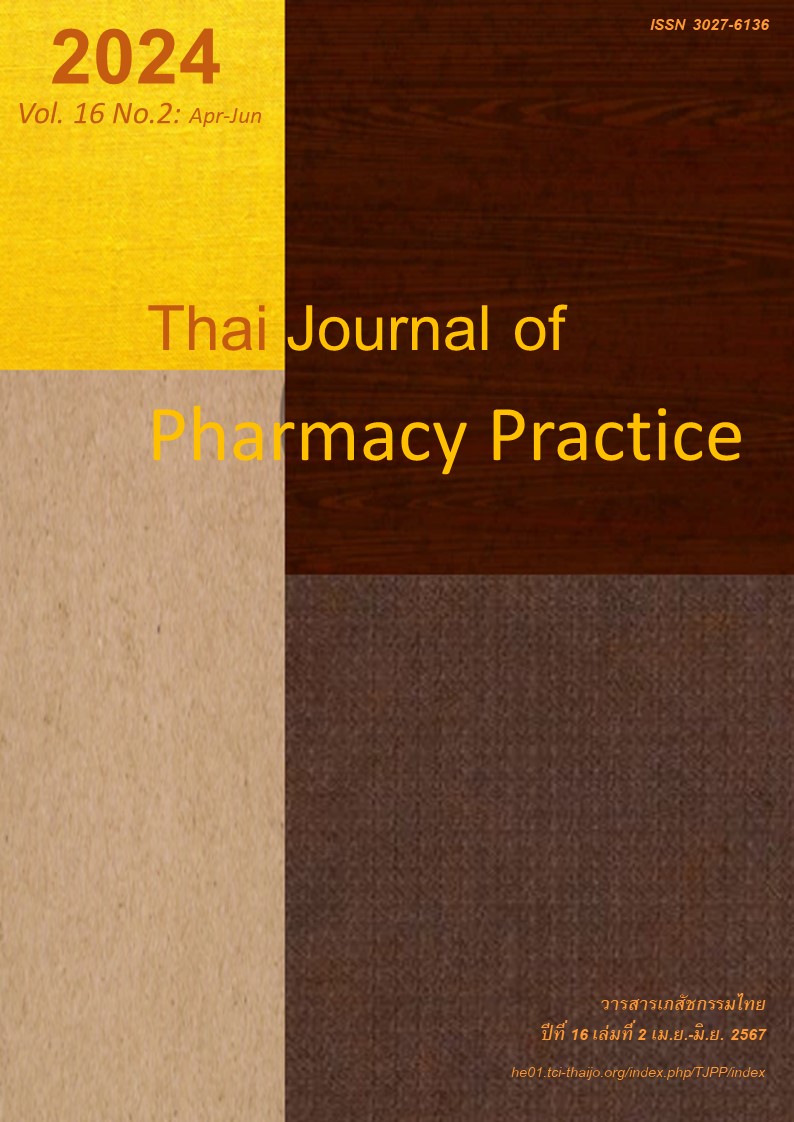A Survey on the Practice on Smoking Cessation among Pharmacy Graduates in Thailand
Main Article Content
Abstract
Objective: To survey the extent of provision of smoking cessation service among pharmacy graduates in Thailand and identify its affecting factors. Methods: This survey research collected data from 358 graduates of 19 Faculties of Pharmacy in Thailand who graduated during academic year 2018 - 2020. The subjects were conveniently selected. Data collection was conducted from April 2022 to May 2022 using online questionnaires developed by the researchers Results: Most of the subjects were female (67.6%) with average age of 26.15 ± 1.73 years. 76.5% of them graduated in the program on pharmaceutical care, while 60.9% graduated in the academic year 2020. 95.5% of them had pharmacy licenses. 41.9% were hospital pharmacists, and had 1-1.9 years of work experience (42.2%). Most of them had learned about cigarette (77.7%) in school with an average of 9.25 ± 7.29 hours. 60.9% of subjects had provided smoking cessation services during their studies with an average of 3.14 ± 3.90 cases per year. After graduation, most of them never offered smoking cessation services, never attended additional training and never participated in a smoking cessation project (64.8%, 84.6%, and 90.8%, respectively). Factors contributing most to the provision of smoking cessation services were happiness at work followed by executives at all levels giving importance to smoking cessation services, having clear goals and setting effective work systems (mean scores of 3.84±1.06, 3.74±1.13 and 3.69±1.09 respectively, from the full score of 5). Work experience, training on smoking cessation after graduation, and providing smoking cessation services during schooling showed a statistically significant correlation with the provision of smoking cessation service (P<0.05). Conclusion: The role of pharmacists in providing smoking cessation services should be emphasized during schooling and post-graduate training. Pharmacy organizations with clear policy and work plans on the service and with a good working environment were facilitating factors for pharmacists to provide smoking cessation services for public.
Article Details

This work is licensed under a Creative Commons Attribution-NonCommercial-NoDerivatives 4.0 International License.
ผลการวิจัยและความคิดเห็นที่ปรากฏในบทความถือเป็นความคิดเห็นและอยู่ในความรับผิดชอบของผู้นิพนธ์ มิใช่ความเห็นหรือความรับผิดชอบของกองบรรณาธิการ หรือคณะเภสัชศาสตร์ มหาวิทยาลัยสงขลานครินทร์ ทั้งนี้ไม่รวมความผิดพลาดอันเกิดจากการพิมพ์ บทความที่ได้รับการเผยแพร่โดยวารสารเภสัชกรรมไทยถือเป็นสิทธิ์ของวารสารฯ
References
Sirirassamee B, Jampaklay A, Holumyong C, Siriras samee T, Konkaew T, Gainroj P. National survey on the impact of tobacco consumption control policies in Thailand: Group of smokers Round 6 (2012). Nakhon Pathom: Institute for Population and Social Research, Mahidol University; 2012.
World Health Organization. WHO report on the global tobacco epidemic 2008 [online]. 2008 [cited Mar 10, 2021]. Available from: apps.who.int/ iris/ bitstream/ 10665/43818/1/9789241596282_eng.pdf
The International Health Policy Program. Report on the burden of diseases and injuries of the Thai population. Nonthaburi: International Health Policy Program; 2017.
Tobacco Control Research and Knowledge Manage ment Center. Tobacco consumption situation in the Thai population 2018. Bangkok: Mahidol University; 2018.
National Health Security Office (NHSO). The right to good health, prevent disease [online]. 2020 [cited Apr 22, 2022] Available from: www.nhso.go.th/page/ coverage_rights_health_enhancement
Tobacco Products Control Act B.E. 2560 (A.D. 2017). Royal Gazette No. 134, Part 39 (Apr 5, 2017)
Cochran WG. Sampling technique. 2nd ed New York: John Wiley and Sons; 1963.
Manion J. Joy at work: Creating a positive workplace. J Nurs Admin 2003; 33: 652-5.
Praingam B, Benjakul S, Kittipichai W. Predicting factors the provision of smoking cessation services among dentists. Journal of Public Health. 2019; 49: 81-94.
Hanioka T, Ojima M, Kawaguchi Y, Hirata Y, Ogawa H, Mochizuki Y. Tobacco interventions by dentists and dental hygienists. Jpn Dent Sci Rev 2013; 49: 47-56.
Bandura A. Self-efficacy: Toward a unifying theory of behavioral change. Psychol Rev 1977; 84: 191-215.
Diana KC. Factors that explain and predict commu- nity pharmacists' provision of smoking cessation services: An application of the integrated behavioral model [master’s thesis]. Ohio: University of Toledo; 2019.
Simansalam S, Shamsudin SH, Mohamed MHN. Malaysian pharmacy students' intention to provide smoking cessation counseling. Curr Pharm Teach Learn 2017; 9: 918-24.
Chatdokmaiprai K, Roojanavech S. Factors predicting smoking cessation service behaviors of community nurses in Nakhon Pathom Province. Journal of Nursing and Health Sciences. 2021; 15: 112-28.
Huang C, Guo C, Yu S, Feng Y, Song J, Eriksen M, et al. Smoking behaviors and cessation services among male physicians in China: evidence from a structural equation model. Tob Control 2013; 22(Suppl 2): ii27-33.


